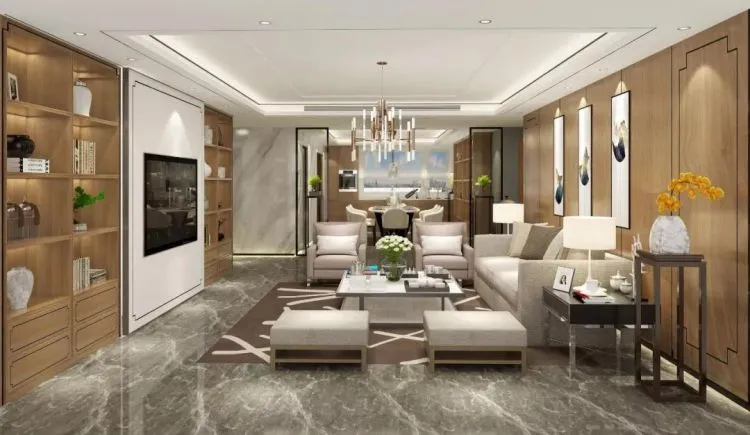Stone is mainly used in the field of architectural decoration. Compared with other decorative materials, the marked feature is that the stone belongs to natural minerals, and its unique decoration in many aspects such as color, texture, pattern and hardness. In addition to the type and color of the stone, the price, quality and durability of the stone are also the main considerations:
1. Stone price
Stone belongs to natural ore. Different grades of stone will have significant differences in price due to their different quality, quantity, mining area and processing technology. This requires the owner and designer to select the appropriate stone according to the project budget. To do this, you should have a considerable understanding of the price of stone. Nowadays, most of the stone consumers have entered a misunderstanding: the stone with high price is good stone, or the imported stone is definitely better than domestic stone.
Of course, it should be affirmed that the imported blue diamond, Indian red and other stone have unique decorative features and have irreplaceable decorative effects. But we should also see: some China domestic stone such as Dahua Green, Baoxing White, Black and White Pine, Hangjie, Yixing Coffee, China Black and Fengzhen Black is not worse than imported stone, such as Brazilian white, emperador, black granite, and even some varieties are better than imported products.
If we compare the prices of these varieties, it is not difficult to see that the price of imported products is 3 to 5 times that of similar Chinese products. So why don't our consumers choose these inexpensive China domestic stone?
2. Stone quality
2.1 Color. In addition to avoiding the use of stone with more obvious color difference, you should also avoid the use of colored stone.
2.2 The composition of the stone content. First, avoid using stone materials that contain excessively high levels of iron sulfide, salt, carbon, clay, etc.; secondly, avoid using stone materials that contain excessively high expansion coefficients and thermally conductive minerals.
3. Years of use and durability
Stone has a high status in decorative materials and has irreplaceable decorative properties. It is commonly used on the "facade" of buildings, so the owners hope that stone and building have the same vitality. Stone with good durability can not only ensure the aesthetic appearance of the building, but also extend the renovation period of the building. Therefore, when stone is used as the decorative material for the exterior wall and the ground and the hall, the following aspects must be investigated for the stone:
1. Physical properties. Stones must withstand many external forces including gravity, wind, vibration, temperature changes, wear and load. This requires high strength of the stone, especially the stone installed in the high position.
2. Chemical properties. Stones must be fairly resistant to chemical attack such as weathering, hydration, dissolution, dehydration, acidification, reduction and carbonate. To do this, the stone must be waterproof.
3. Structural strength. When selecting directional stones such as slate and shale, attention must be paid to the structural strength in different directions.
4. Water absorption rate. The molecular structure of the stone is relatively stable when it is mined, but when it is exposed to the atmosphere, the poor coordination between the minerals inside the stone occurs, such as limestone encountering acid (The reaction product of sulfurous acid gas and water in the air), dissolving the surface to form calcium sulfate, which causes collapse of sandstone and the like. Therefore, when selecting stone, you should try to choose stone with uniform pore distribution, small pore size and low water absorption.

1. Stone price
Stone belongs to natural ore. Different grades of stone will have significant differences in price due to their different quality, quantity, mining area and processing technology. This requires the owner and designer to select the appropriate stone according to the project budget. To do this, you should have a considerable understanding of the price of stone. Nowadays, most of the stone consumers have entered a misunderstanding: the stone with high price is good stone, or the imported stone is definitely better than domestic stone.
Of course, it should be affirmed that the imported blue diamond, Indian red and other stone have unique decorative features and have irreplaceable decorative effects. But we should also see: some China domestic stone such as Dahua Green, Baoxing White, Black and White Pine, Hangjie, Yixing Coffee, China Black and Fengzhen Black is not worse than imported stone, such as Brazilian white, emperador, black granite, and even some varieties are better than imported products.
If we compare the prices of these varieties, it is not difficult to see that the price of imported products is 3 to 5 times that of similar Chinese products. So why don't our consumers choose these inexpensive China domestic stone?
2. Stone quality
2.1 Color. In addition to avoiding the use of stone with more obvious color difference, you should also avoid the use of colored stone.
2.2 The composition of the stone content. First, avoid using stone materials that contain excessively high levels of iron sulfide, salt, carbon, clay, etc.; secondly, avoid using stone materials that contain excessively high expansion coefficients and thermally conductive minerals.
3. Years of use and durability
Stone has a high status in decorative materials and has irreplaceable decorative properties. It is commonly used on the "facade" of buildings, so the owners hope that stone and building have the same vitality. Stone with good durability can not only ensure the aesthetic appearance of the building, but also extend the renovation period of the building. Therefore, when stone is used as the decorative material for the exterior wall and the ground and the hall, the following aspects must be investigated for the stone:
1. Physical properties. Stones must withstand many external forces including gravity, wind, vibration, temperature changes, wear and load. This requires high strength of the stone, especially the stone installed in the high position.
2. Chemical properties. Stones must be fairly resistant to chemical attack such as weathering, hydration, dissolution, dehydration, acidification, reduction and carbonate. To do this, the stone must be waterproof.
3. Structural strength. When selecting directional stones such as slate and shale, attention must be paid to the structural strength in different directions.
4. Water absorption rate. The molecular structure of the stone is relatively stable when it is mined, but when it is exposed to the atmosphere, the poor coordination between the minerals inside the stone occurs, such as limestone encountering acid (The reaction product of sulfurous acid gas and water in the air), dissolving the surface to form calcium sulfate, which causes collapse of sandstone and the like. Therefore, when selecting stone, you should try to choose stone with uniform pore distribution, small pore size and low water absorption.

Next: Marble countertop, vanity top, bathroom wall mold treatment
Previous: How to deal with the darkening of quartz stone countertop surface?

